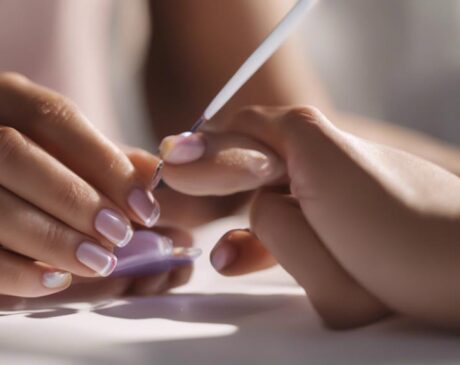What Nail Technique Is Healthiest?
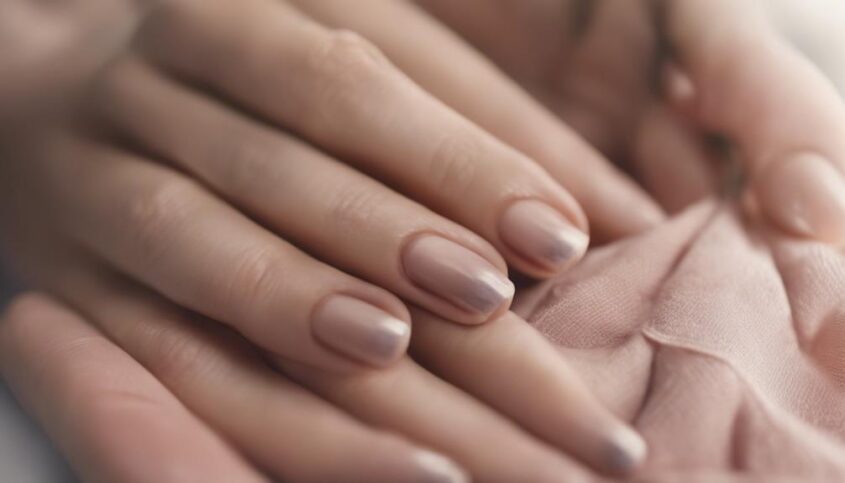
Prioritize natural nail care for healthier nails. Acrylic nails offer durability but can damage natural nails. Gel manicures have quick drying time but require UV or LED lamp curing. Dip powder nails are trendy and long-lasting. Embrace the natural nail look for overall nail health. Compare nail extension techniques for durability and maintenance. Maintain nails with proper care like moisturizing and using protective base coats. Focus on essential nutrients in your diet for stronger nails. Healthy nail technique involves a balance of care and maintenance. Learn more about nail techniques and care options for optimal nail health.
Key Takeaways
- Opt for natural nail looks to promote nail health and reduce risks associated with artificial nails.
- Prioritize nail care practices and proper maintenance for healthy nails.
- Choose dip powder nails for exceptional durability, gentle application, and easy removal.
- Ensure a balanced diet rich in essential nutrients like biotin and Omega-3 for strong and healthy nails.
- Emphasize moisturizing, using protective base coats, and avoiding nail damage for overall nail health.
Pros and Cons of Acrylic Nails
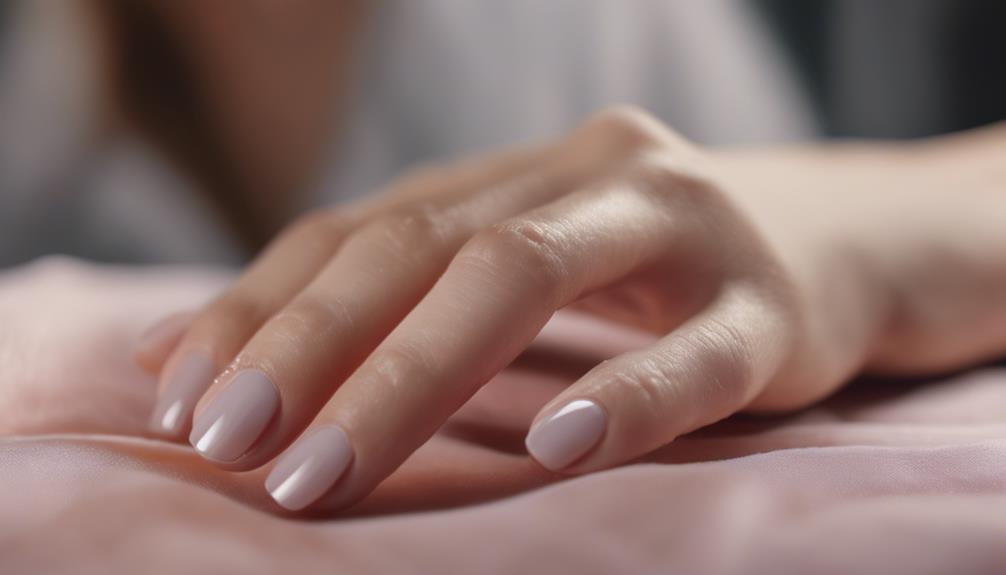
Often praised for their durability and versatility, acrylic nails come with both benefits and drawbacks that individuals should consider before opting for this nail enhancement technique. Acrylic nails are known for their strength and long-lasting nature, making them ideal for individuals looking for a manicure that can withstand daily activities. Additionally, acrylic nails offer a wide range of design options, from simple French tips to elaborate nail art, allowing for creativity and personalization.
However, it is essential to be aware of the potential drawbacks of acrylic nails. One common concern is the damage they can cause to natural nails if not applied or removed correctly. Acrylic nails can also be more challenging to maintain than other nail techniques, requiring regular fills and upkeep to prevent lifting or breakage. Moreover, some individuals may experience allergic reactions to the chemicals used in acrylic nail application.
The Truth About Gel Manicures
Gel manicures have gained popularity in recent years due to their long-lasting finish and glossy appearance. This innovative nail technique involves applying layers of gel polish that are then cured under a UV or LED lamp, resulting in a durable and chip-resistant manicure that can last up to three weeks. One of the main advantages of gel manicures is the quick drying time, allowing individuals to resume their daily activities without the worry of smudged nails. Additionally, the glossy finish of gel manicures gives a polished look that lasts longer than traditional nail polish.
However, it's essential to consider some potential drawbacks of gel manicures. The removal process often requires soaking nails in acetone, which can weaken the nail bed and lead to dryness and brittleness. Moreover, frequent gel manicures without proper breaks can cause damage to the natural nail, such as thinning or peeling. To maintain healthy nails, it's recommended to give nails a break between gel manicures and use nourishing treatments to keep them strong.
Dive Into Dip Powder Nails
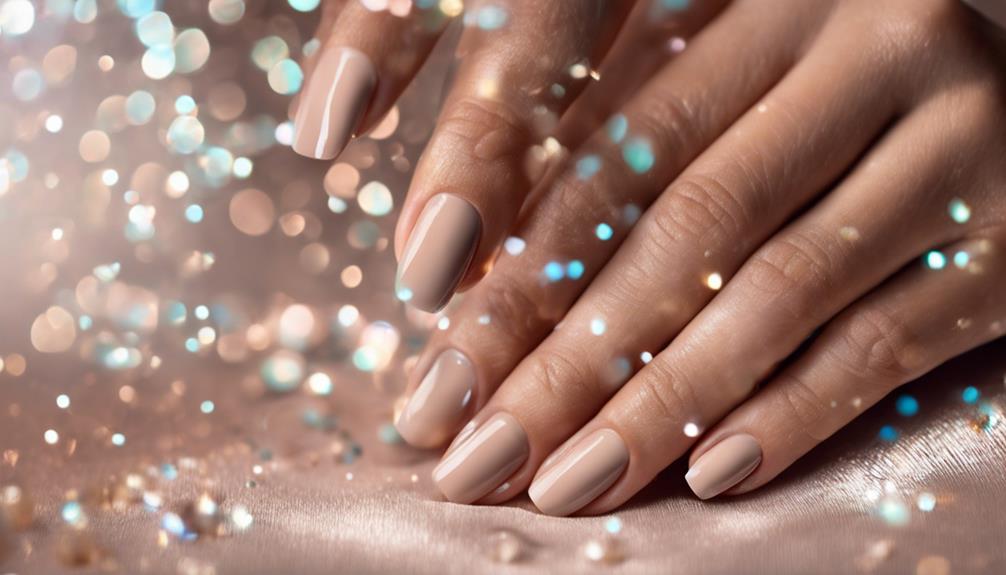
Dive into the world of dip powder nails, a popular nail technique known for its durability and versatility. This innovative method involves applying a base coat, dipping the nails into colored powder, and sealing with a top coat. Here are four reasons why dip powder nails are capturing the attention of nail enthusiasts seeking a long-lasting and stylish solution:
- Exceptional Durability: Dip powder nails are renowned for their strength and durability, lasting up to 4 weeks without chipping or fading.
- Versatile Color Options: With a wide range of colors and finishes available, from matte to shimmer, dip powder nails offer endless possibilities for creative nail designs.
- Gentler Application Process: Unlike acrylics, dip powder nails do not require harsh chemicals or UV light, making them a gentler option for your nails.
- Easy Removal: Removing dip powder nails is a breeze with a simple soak-off process, ensuring a stress-free transition between manicures.
Embrace the trend of dip powder nails for a chic and long-lasting nail look that combines durability with style.
Embracing the Natural Nail Look
In the realm of nail aesthetics, celebrating the inherent beauty of natural nails has become a prominent trend among individuals seeking a more understated and authentic look. Embracing the natural nail look involves enhancing the health and appearance of your nails without the use of artificial extensions or enhancements. This trend is gaining popularity as people recognize the importance of nail health and the elegance that simplicity can bring.
By focusing on the natural nail, individuals can showcase their nails' unique shapes, lengths, and colors. This approach promotes nail care practices that prioritize strength and vitality, leading to healthier nails in the long run. Embracing the natural nail look also allows for more freedom and versatility in nail styling, as it provides a blank canvas for various designs and nail art techniques.
Furthermore, by opting for a natural nail look, individuals can reduce the risk of damage often associated with artificial nails, such as lifting, breakage, and infections. Embracing the beauty of natural nails not only promotes healthier nail habits but also fosters a sense of empowerment and confidence in one's natural beauty.
Comparing Nail Extension Techniques
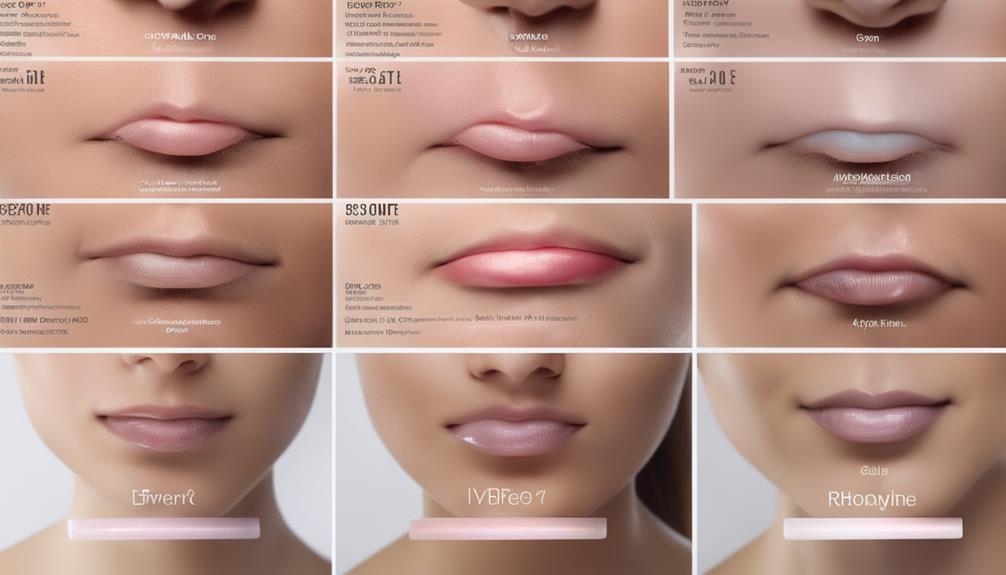
When considering nail extension techniques, it is essential to compare the materials used, as different products can have varying effects on the natural nails. Durability and maintenance are also key factors to analyze, as some techniques may require more upkeep than others. Additionally, understanding the impact each technique has on the health of the natural nails is crucial for making an informed decision on the healthiest nail extension method.
Material Comparison
In evaluating various nail extension techniques, a critical aspect to consider is the comparison of materials utilized. Different materials offer unique benefits and drawbacks, influencing the overall health and aesthetics of nail extensions. When comparing materials, it's essential to consider:
- Acrylic: Known for its durability, acrylic nails are a popular choice for their strength and versatility.
- Gel: Gel extensions provide a natural look and are ideal for those seeking a lightweight and flexible option.
- Dip Powder: Offering a long-lasting finish, dip powder nails are favored for their quick application and vibrant colors.
- Polygel: Combining the best of acrylic and gel, polygel nails are praised for their easy application and natural feel.
Each material has its unique characteristics, catering to diverse preferences in the pursuit of healthier nail techniques.
Durability and Maintenance
Considering the longevity and upkeep of various nail extension techniques, their durability and maintenance play a significant role in determining the most suitable option for individuals seeking a lasting and low-maintenance nail enhancement solution. Gel extensions are renowned for their durability, often lasting up to three weeks without chipping. Acrylic nails are known for their robustness but may require more frequent maintenance due to lifting. On the other hand, dip powder nails offer a balance between strength and longevity, typically lasting two to four weeks. When it comes to maintenance, gel and dip powder nails generally require less frequent fills compared to acrylic nails. Understanding these differences can help individuals choose a nail extension technique that aligns with their lifestyle and preferences.
Impact on Natural Nails
Among the various nail extension techniques available, it is essential to analyze the impact on natural nails to make an informed decision when choosing between gel, acrylic, or dip powder nails. When considering the health of your natural nails, here are some key points to keep in mind:
- Gel nails: Known for their flexibility and natural appearance, gel nails are generally gentler on the natural nail bed.
- Acrylic nails: While durable, acrylic nails can be harsh on natural nails due to the chemicals used during application and removal.
- Dip powder nails: Considered a healthier alternative, dip powder nails require no UV light and are less damaging during the removal process.
- Proper maintenance: Regardless of the technique chosen, regular upkeep and proper nail care are crucial for maintaining the health of your natural nails.
DIY Nail Care Tips at Home
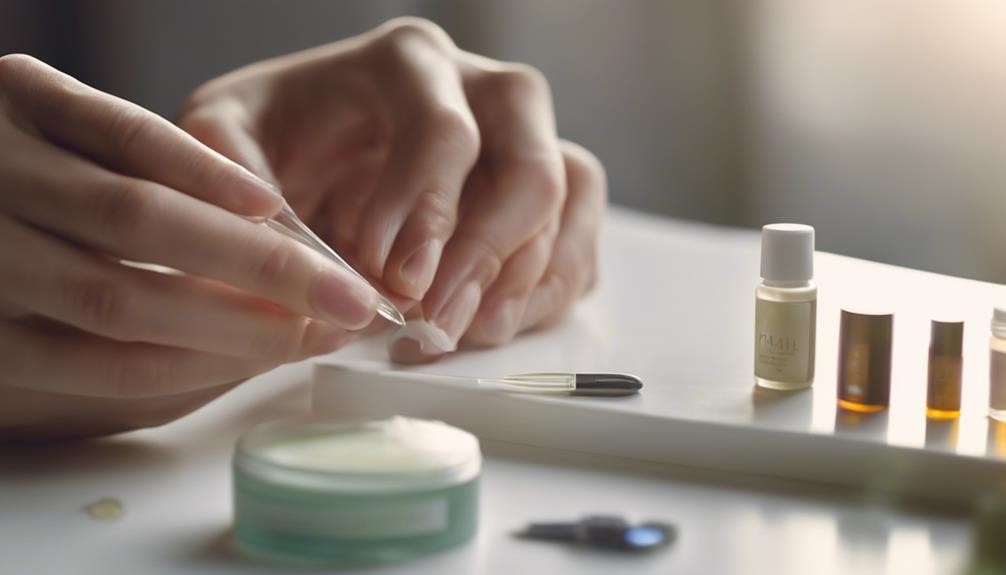
Implementing effective DIY nail care tips at home can help maintain the health and appearance of your nails. Regular maintenance is key to ensuring your nails stay strong and beautiful. Here are some innovative tips for DIY nail care that you can easily incorporate into your routine:
| Tip | Description | Benefits |
|---|---|---|
| Keep nails clean | Regularly wash your hands and nails to prevent dirt and bacteria buildup | Reduces risk of infections |
| Moisturize nails | Use a nourishing nail oil or cream to keep nails hydrated and healthy | Prevents brittleness and breakage |
| Trim nails properly | Cut nails straight across and file the edges for a neat finish | Helps prevent ingrown nails |
| Avoid harsh chemicals | Use acetone-free nail polish remover and gentle products | Prevents drying and weakening of nails |
| Protect nails | Wear gloves while doing chores or using harsh chemicals | Prevents damage and breakage |
Nutrition for Stronger Nails
Nutrition plays a vital role in maintaining strong and healthy nails. Essential nutrients like biotin, vitamin E, and omega-3 fatty acids are crucial for promoting nail strength and growth. Including foods rich in these nutrients, such as eggs, nuts, seeds, and fish, can help improve the overall health of your nails.
Essential Nutrients for Nails
For maintaining strong and healthy nails, incorporating essential nutrients into your diet is crucial. Ensuring your body receives the right nutrients can promote nail health from within. Here are four key nutrients that play a significant role in strengthening your nails:
- Biotin: Also known as Vitamin B7, biotin supports the growth and maintenance of strong nails.
- Omega-3 Fatty Acids: Found in foods like salmon and chia seeds, omega-3 fatty acids help prevent brittle nails.
- Vitamin E: This antioxidant vitamin aids in moisturizing and nourishing your nails, keeping them healthy.
- Iron: Iron deficiency can lead to brittle nails, so incorporating iron-rich foods like spinach and lentils is essential for nail health.
Foods for Nail Health
Enhancing the strength and resilience of your nails can be achieved through a balanced and nutrient-rich diet. Including certain foods in your daily meals can promote healthier nails. Foods rich in biotin, such as nuts, seeds, and sweet potatoes, can improve nail thickness and reduce brittleness. Incorporating sources of omega-3 fatty acids like salmon, chia seeds, and walnuts can help moisturize nails from within, preventing breakage. Protein-rich foods like lean meats, beans, and legumes are vital for nail structure and growth. Additionally, consuming plenty of fruits and vegetables rich in vitamins A, C, and E can contribute to overall nail health. By focusing on these nutrient-dense foods, you can nourish your nails from the inside out, promoting stronger and more resilient nails.
Professional Nail Care Advice
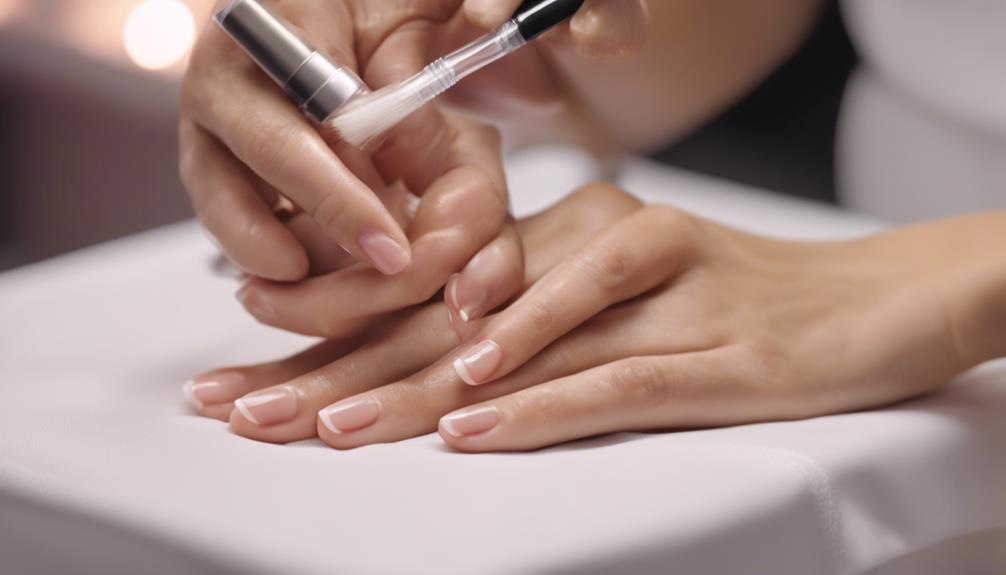
Implementing proper nail care techniques is essential for maintaining healthy and beautiful nails. To ensure your nails stay strong and gorgeous, here are four innovative professional nail care tips to consider:
- Moisturize Regularly: Hydrated nails are less likely to break or split. Incorporate a high-quality nail and cuticle oil into your daily routine to keep your nails moisturized and healthy.
- Use Protective Base Coats: Before applying nail polish, always use a protective base coat. This will not only help your nail polish last longer but also shield your nails from potential damage caused by pigmented polishes.
- Invest in Quality Tools: Using the right tools for nail care is crucial. Opt for high-quality nail clippers, files, and buffers to prevent nail damage and ensure a precise manicure.
- Practice Proper Nail Techniques: When shaping your nails, file them in one direction to prevent splitting. Avoid using your nails as tools to open things, as this can weaken and break them.
Frequently Asked Questions
Are There Any Alternative Nail Techniques That Are Not Mentioned in the Article?
Exploring emerging nail techniques can offer unique alternatives not covered in the article. Innovations like magnetic nails, marble nails, or jelly nails provide creative options for those seeking something different in nail art and design.
How Do Different Nail Techniques Affect Nail Health in the Long Term?
Different nail techniques can have varying impacts on long-term nail health. Factors like product ingredients, application methods, and maintenance routines play crucial roles. Understanding these effects can help individuals make informed choices to promote healthier nails.
Can Certain Nail Techniques Lead to Allergic Reactions or Skin Irritations?
Certain nail techniques can indeed lead to allergic reactions or skin irritations. It is crucial to consider the products used, application methods, and individual sensitivities. Regularly monitoring for any signs of irritation and seeking professional advice is recommended.
What Are Some Common Misconceptions About Nail Care and Nail Techniques?
Common misconceptions about nail care and techniques include the belief that frequent polishing weakens nails, when proper hydration and breaks are key. Additionally, cutting cuticles is often thought to be necessary, yet it can lead to infections.
Are There Any Specific Recommendations for Nail Care Products or Tools That Can Help Maintain Healthy Nails?
In maintaining healthy nails, specific recommendations revolve around using quality nail care products and tools. Regular moisturizing, trimming, and avoiding harsh chemicals are essential practices. Consult with a nail care professional for personalized advice.



